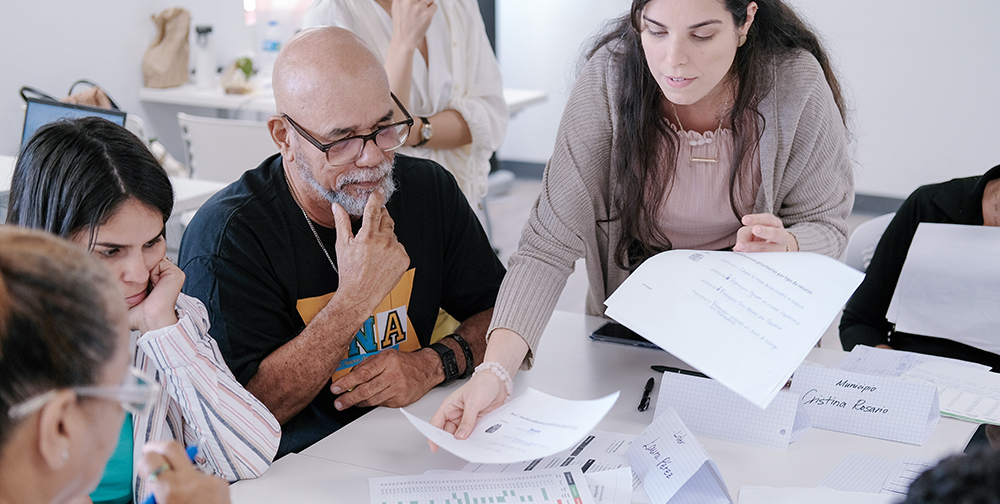 Public Health Disaster Award Program recipient Pamela Silva Díaz conducts a tabletop exercise in Ponce, Puerto Rico. Image credit: Wei-Ching Azury Lin, 2023.
Public Health Disaster Award Program recipient Pamela Silva Díaz conducts a tabletop exercise in Ponce, Puerto Rico. Image credit: Wei-Ching Azury Lin, 2023.
We’re pleased to announce that we’ve added 14 new publications to our ongoing Public Health Disaster Research Award Series. The new work details research and community engagement efforts produced in response to our third call for proposals in the series and first-ever continuation award call.
The two efforts focused on research in tribal areas, rural communities, and territories in the United States. These communities are at higher risk to adverse disaster impacts—including death and property loss—than many other areas across the nation. Research is needed to develop evidence-based practices that can improve preparedness, resilience, and public health response to disasters in these areas.
To address these gaps in knowledge, the Natural Hazards Center—with support from the Centers for Disease Control and Prevention and the National Science Foundation—issued a call for proposals focused on public health preparedness, response, and resilience.
We learned at the end of the two previous calls in the program series that awardees felt there were opportunities to increase the impact of their projects. The continuation award was designed to meet this need and allow teams previously funded by the program to extend their work.
The findings from these studies and results from the community engagement projects are now available. The projects are focused around themes of public health tools for emergency preparedness, strengthening resilience, and expanding public health disaster research and community engagement.
Find the entire series of research reports here, examine the community engagement briefs here, or browse individual reports and briefs below. You can also view a recorded webinar of report authors discussing their results.
Public Health Reports
Assessing Intra-Community Public Health Impacts from Compounding Food, Energy, and Water Insecurities
Anaís Delilah Roque, Enid Quintana, Sameer H. Shah, Mary Angelica Painter, Fernando Cuevas, and Fernando Tormos-Aponte
Mapping Puerto Rican Student Vulnerability and Risk To Improve School Emergency Planning
Eileen V. Segarra-Alméstica, Yolanda Cordero, and Amílcar Vélez-Flores
Evacuation Decision-Making Post-Vaccine: Implications of Compound Hazards in U.S. Territories
Jennifer Collins, Elizabeth Dunn, Justin Hartnett, Leslie Maas Cortes, and Rashida Jones
Steep Risks: Assessing Social Vulnerability to Landslides in Rural Puerto Rico
Jocelyn West, Luis Alexis Rodriguez-Cruz, and K. Stephen Hughes
Validating the Disaster Food Security Scale for Rural U.S. Populations
Lauren Clay, Nadia Koyratty, Anna Josephson, and Carmen Byker Shanks
Assessing Impacts of Hurricane Maria for Promoting Healthcare Resilience in Puerto Rico
Pallab Mozumder, Linnette Rodríguez-Figueroa, Mayra Quiles-Miranda, Barsha Manandhar, Sisi Meng, and Nafisa Halim
Harmful Algal Blooms: Community-Based Participatory Research to Improve Rural Public Health Practice
Amber Roegner, Mike Mader, Anjana Adhikari, Zarah Wemple, Summer Zelinksy, Keira Embry, and Todd Rex Miller
Risk and Health Communication During Hurricane Fiona in Puerto Rico and Hurricane Ian in Florida
Federico Subervi-Vélez, Sandra M. Fábregas-Troche, Mirelsa Modestti-González, Gary L. Kreps, and Hilda Patricia García-Cosavalente
Energy Service Security for Public Health Resilience in Michigan’s Western Upper Peninsula
Shardul Tiwari, Zoē Ketola, Chelsea Schelly, and Eric Boyer-Cole
Public Health Computer Simulation Tool to Support Disaster Preparedness in Rural Communities
Kristina Kintziger, Tom Berg, Tracey Stansberry, Scott Lawson, Gerald Jones, Jr., and Liem Tran
Community Engagement Briefs
Improving Disaster Information and Communication Technology Solutions In Puerto Rico: Co-Designed Community-Based Tabletop Exercises
Jasmine Yiyuan Qin, Wei-Ching Azury Lin, Pamela Silva Díaz, Natalia Arcila, Jonathan Sury, and Robert Soden
Strengthening Disaster Preparedness and Response in the Northern Mariana Islands Through First Aid Training: The Basic Disaster First Aid Curriculum
Todd Miner, Tayna C. Belyeu-Camacho, Geraldine T. A. Rodgers, Patrick I. George, and Steven A. Aguon
Support for Frontline Government Workers At-Risk for Burnout in the U.S. Virgin Islands: The Coping With Burnout Webinar Series
Kula A. Francis, Kenny A. Hendrickson, and Anna M. Clarke